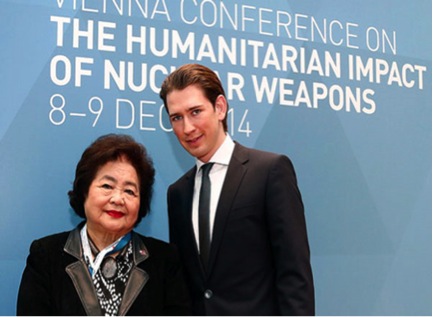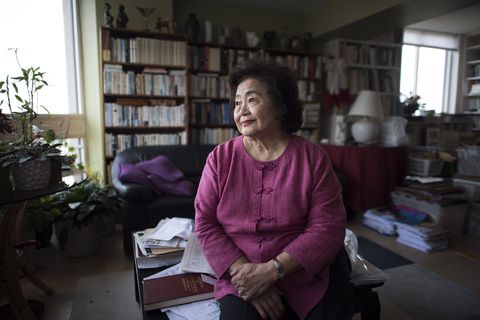
Survivante de Hiroshima et citoyenne canadienne active avec Pugwash Canada, Setsuko Thurlow voyage à travers le monde et, à l’occasion de cette photo, elle appuyait en Europe en 2014 le jeune ministre autrichien des Affaires étrangères Sebastian Kurz et son discours « en urgence humanitaire » contre la bombe, qui a contribué à lancer les négociations à l’ONU du nouveau Traité.
Cette photo (et légende) faisait partie de notre article du 21 juin rapportant notre manif anti-bombes nucléaires du 17 juin avec le Mouvement Québécois pour la Paix à Montréal [1]. Même si nous condamnons évidemment les prises de position anti-immigration de l’ambitieux politicien de droite, nous saluons quand même l’arrivée au pouvoir comme chancelier de l’Autriche à 31 ans de Sebastian Kurz (ÖVP), comme une illustration de l’universalité du combat contre la bombe nucléaire : notez donc bien, M. Trudeau, qu’il ne s’agit pas d’un autre combat de la gauche déconnectée et remplie d’illusions du NPD, joint par le Bloc Québécois, le Parti Vert et les pacifistes alliés, comme vous semblez mépriser avec les Libéraux au pouvoir et l’Opposition officielle conservatrice à Ottawa.
On apprend d’autre part avec fierté que madame Setsukow Thurlow, membre de Pugwash Canada, ira chercher le prix Nobel de la Paix 2017 à Oslo : lire l’article du Globe & Mail en annexe 3.
Quelle honte que jamais le Premier ministre Trudeau n’ait jugé bon de féliciter l’organisme ICANW.org qui a obtenu le prix, comme nous le rapporte Hélène Laverdière, porte-parole des Affaires globales pour le NPD.
Dans notre article rendant compte de notre manif présidée par le président démissionnaire domlebo juste avant la cérémonie officielle du 5 août au Jardin Botanique [2] , les APLP estimaient que la commémoration d’Hiroshima par le maire Coderre aurait dû contenir une référence au Traité d’interdiction des armes nucléaires mis de l’avant par ICANW.org. Notre article était d’ailleurs suivi par un premier addendum qui citait dans le contexte de la cérémonie connexe en mémoire d’Hiroshima présidée le 6 août à Toronto par notre collègue et amie Phyllis Creighton, les mots de notre éminente collègue Thurlow :
On 20 September, this Ban-Treaty will open for signature at the United Nations, and all governments are invited to join it. Dear friends, At 8:15, on 6th August 1945, I, then a 13-year-old schoolgirl, witnessed my city of Hiroshima blinded by the flash, flattened by the hurricane-like blast, burned in the heat of 4000 degrees Celsius and contaminated by the radiation of one atomic bomb. A bright summer morning turned to dark twilight with smoke and dust rising in the mushroom cloud, dead and injured covering the ground, begging desperately for water and receiving no medical care at all. The spreading firestorm and the foul stench of burnt flesh filled the air. Many survivors of the nuclear bombs over Hiroshima and Nagasaki have died in recent years with their dreams of nuclear abolition unfulfilled. Their motto was, “abolition in our lifetime”. A month ago, I took a part in a truly extraordinary event. On 7th July 2017, a majority of countries in the world adopted a treaty prohibiting nuclear weapons. I had been waiting for this day for seven decades and I am overjoyed that it has finally arrived. The treaty categorically prohibits nuclear weapons and creates obligations to support the victims of nuclear weapons use and testing, as well as to remediate the environmental damage caused by nuclear weapons. This is a historic breakthrough – the beginning of the end of nuclear weapons.
You can find out more information about the treaty and the signing and ratification process on www.nuclearban.org. Will you help us get your government to sign the treaty? You can send an email to your government here, telling them you want them to sign the treaty! The number of people who remember the catastrophic humanitarian suffering caused by nuclear weapons in Hiroshima and Nagasaki are dwindling. For those of us who remain, we are proud that we have banned nuclear weapons in our lifetime.
Yours sincerely, Setsuko Thurlow
Peace activist and survivor of the atomic bombing of Hiroshima.
Assurez-vous svp, ami lecteur, que vous avez mis à jour votre membership aux Artistes pour la Paix et que vous vous joindrez le 1er novembre à notre Assemblée générale spéciale (à 19h, au 3e étage du restau VÉGO rue St-Denis près d’Ontario) afin de nommer un conseil d’administration assez fort pour poursuivre efficacement la lutte anti-nucléaire, qui est la marque distinctive des APLP depuis leur fondation en 1984 à l’époque des Performing Artists for Nuclear Disarmament.
[1] http://www.artistespourlapaix.org/?p=13550
[2] http://www.artistespourlapaix.org/?p=13844
Annexes
1OSLO (Reuters) – Following is the text of the Nobel Peace Prize award on Friday the 6th of October to the International Campaign to Abolish Nuclear Weapons: The Norwegian Nobel Committee has decided to award the Nobel Peace Prize for 2017 to the International Campaign to Abolish Nuclear Weapons (ICAN).The organization is receiving the award for its work to draw attention to the catastrophic humanitarian consequences of any use of nuclear weapons and for its ground-breaking efforts to achieve a treaty-based prohibition of such weapons.
We live in a world where the risk of nuclear weapons being used is greater than it has been for a long time. Some states are modernizing their nuclear arsenals, and there is a real danger that more countries will try to procure nuclear weapons, as exemplified by North Korea.
Nuclear weapons pose a constant threat to humanity and all life on earth. Through binding international agreements, the international community has previously adopted prohibitions against land mines, cluster munitions and biological and chemical weapons. Nuclear weapons are even more destructive, but have not yet been made the object of a similar international legal prohibition.
Through its work, ICAN has helped to fill this legal gap. An important argument in the rationale for prohibiting nuclear weapons is the unacceptable human suffering that a nuclear war will cause. ICAN is a coalition of non-governmental organizations from around 100 different countries around the globe.
The coalition has been a driving force in prevailing upon the world’s nations to pledge to cooperate with all relevant stakeholders in efforts to stigmatize, prohibit and eliminate nuclear weapons. To date, 108 states have made such a commitment, known as the Humanitarian Pledge.
Furthermore, ICAN has been the leading civil society actor in the endeavor to achieve a prohibition of nuclear weapons under international law. On 7 July 2017, 122 of the UN member states acceded to the Treaty on the Prohibition of Nuclear Weapons.
As soon as the treaty has been ratified by 50 states, the ban on nuclear weapons will enter into force and will be binding under international law for all the countries that are party to the treaty.
The Norwegian Nobel Committee is aware that an international legal prohibition will not in itself eliminate a single nuclear weapon, and that so far neither the states that already have nuclear weapons nor their closest allies support the nuclear weapon ban treaty.
The Committee wishes to emphasize that the next steps towards attaining a world free of nuclear weapons must involve the nuclear-armed states. This year’s Peace Prize is therefore also a call upon these states to initiate serious negotiations with a view to the gradual, balanced and carefully monitored elimination of the almost 15,000 nuclear weapons in the (…)
2Discours de réception du prix
It is a great honour to have been awarded the Nobel Peace Prize for 2017 in recognition of our role in achieving the Treaty on the Prohibition of Nuclear Weapons. This historic agreement, adopted on 7 July with the backing of 122 nations, offers a powerful, much-needed alternative to a world in which threats of mass destruction are allowed to prevail and, indeed, are escalating.
The International Campaign to Abolish Nuclear Weapons (ICAN) is a coalition of non-governmental organizations in one hundred countries. By harnessing the power of the people, we have worked to bring an end to the most destructive weapon ever created – the only weapon that poses an existential threat to all humanity.
This prize is a tribute to the tireless efforts of many millions of campaigners and concerned citizens worldwide who, ever since the dawn of the atomic age, have loudly protested nuclear weapons, insisting that they can serve no legitimate purpose and must be forever banished from the face of our earth.
It is a tribute also to the survivors of the atomic bombings of Hiroshima and Nagasaki – the hibakusha – and victims of nuclear test explosions around the world, whose searing testimonies and unstinting advocacy were instrumental in securing this landmark agreement.
The treaty categorically outlaws the worst weapons of mass destruction and establishes a clear pathway to their total elimination. It is a response to the ever-deepening concern of the international community that any use of nuclear weapons would inflict catastrophic, widespread and long-lasting harm on people and our living planet.
We are proud to have played a major role its creation, including through advocacy and participation in diplomatic conferences, and we will work assiduously in coming years to ensure its full implementation. Any nation that seeks a more peaceful world, free from the nuclear menace, will sign and ratify this crucial accord without delay.
The belief of some governments that nuclear weapons are a legitimate and essential source of security is not only misguided, but also dangerous, for it incites proliferation and undermines disarmament. All nations should reject these weapons completely – before they are ever used again.
This is a time of great global tension, when fiery rhetoric could all too easily lead us, inexorably, to unspeakable horror. The spectre of nuclear conflict looms large once more. If ever there were a moment for nations to declare their unequivocal opposition to nuclear weapons, that moment is now.
We applaud those nations that have already signed and ratified the Treaty on the Prohibition of Nuclear Weapons, and we urge all others to follow their lead. It offers a pathway forward at a time of alarming crisis. Disarmament is not a pipe dream, but an urgent humanitarian necessity.
We most humbly thank the Norwegian Nobel Committee. This award shines a needed light on the path the ban treaty provides towards a world free of nuclear weapons. Before it is too late, we must take that path.
International Campaign to Abolish Nuclear Weapons
3Un article du Globe & Mail du 27 octobre.
NOBEL PEACE PRIZE
Canadian woman who survived Hiroshima bombing urges change of heart from Trudeau
Cliquez ici : http://trk.cp20.com/click/kip6v-c7honm-788fpyk9/

85-year-old Setsuko Thurlow was 13 when she survived a nuclear bomb dropped on the Japanese city of Hiroshima.
Bonjour, nous serions heureux qu’une ou un artiste ou personnage public non politicien de grande notoriété s’engage maintenant fortement pour l’élimination effective des bombes atomiques et pour le respect par les États nucléaires de leur véritable engagement au désarmement nucléaire général et complet. Les prochaines élections européennes devraient être l’occasion de faire réagir les populations sur cette menace barbare qui met en danger toute civilisation. Merci d’entendre cet appel.